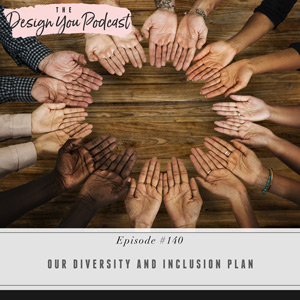
If there’s one thing that 2020 has taught me, friends, it’s that there’s no longer such thing as being ‘not racist’ – you’re either racist or anti-racist. As many of you will know, I’ve been working this year to make my business anti-racist, so as the year draws to a close, I wanted to share our diversity and inclusion plan for 2021 and beyond.
I believe that if you have any kind of business, it’s no longer an option to be private about your values. For me, not speaking up means I might be perceived to be a racist business owner, and that is just not an option! I’m by no means an expert, but this week I’m sharing my process to show people exactly how I’m creating an anti-racist business and how you can too.
Join me this week as I discuss the important work I’ve been doing with Equity, Diversity, and Inclusion Coach, Trudi Lebron, and the steps we’re taking to make the business accessible for all. I’m sharing some important resources to help you do this work yourself and showing you how to align your business with your core values. If you are interested in doing this work in your own company, you’ll be really excited about this episode!
If you are Black, Brown, Indigenous, or a Person of Color, we’ve launched a new scholarship for a year-long membership of Design You! Click here for more details, but be quick! Applications close at 11:59 pm Pacific Time on December 11th, 2020!
If you want help in creating financial freedom and building a business that’s fun and thriving, get on over to the Design You Coaching Program! We only enroll a few times a year, so be sure to sign up for the waiting list ASAP to be notified when we next open our doors!





